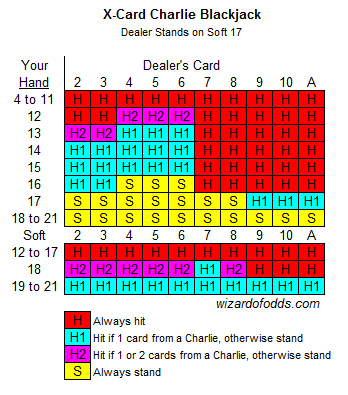Ask The Wizard #188
As part of my desire to increase my game knowledge, as a casino dealer, I began reading your site years ago. I seem to remember reading that the dealer’s average non-blackjack winning hand is 18.56. Today, as an instructor, I sought that fact to show my students and was unable to locate it. What is the correct answer and how is it calculated? Thank you.
The table below shows the average dealer score, assuming the dealer does not bust, and the dealer already checked for blackjack, according to various rules. Note how the average score increases with the number of decks. More importantly, note that the average score is 0.0405 higher when the dealer hits soft 17. The probability that the dealer will bust is only 0.00403 higher when the dealer hits a soft 17. That is 10.05 extra dealer points per dealer bust. This, hopefully, goes to show why it is bad for the player if the dealer hits a soft 17.
Average Dealer Total in Blackjack
| Decks | Stand Soft 17 | Hit Soft 17 |
| 1 | 18.840371 | 18.880098 |
| 2 | 18.842648 | 18.882868 |
| 3 | 18.843415 | 18.883798 |
| 4 | 18.843826 | 18.884288 |
| 5 | 18.844053 | 18.884564 |
| 6 | 18.844205 | 18.884720 |
| 7 | 18.844292 | 18.884880 |
| 8 | 18.844370 | 18.884981 |
To answer your second question, I used a brute force combinatorial program in C++ to cycle through all the possible combinations of dealer hands.
When I am in Vegas I like to play a friendly game of $5.00 blackjack. To my surprise, on this trip, the $5.00 blackjack table had either disappeared or they were paying 6 to 5 on a blackjack. I played a fair $5.00 game at the El Cortez but was hard pressed to find another casino that provided a $5.00 table with reasonable rules. Do you know of other fair $5.00 games either on the Strip or downtown? Thank you. I wish I had discovered your web site before my recent trip.
Many casinos are indeed paying 6 to 5 on blackjack in their low-limit games, and it is getting worse quickly. However, there are still real blackjack games out there at a $5 minimum. The other rules likely will not be the best, in particular six decks with dealer hitting on soft 17, but at $5 you can’t be too picky. It sounds like you were in town on a very busy weekend, or just didn’t look very hard. Any downtown or off-Strip casino should have some real $5 blackjack tables. Those tables are usually the most crowded. On Strip you should be able to find some token $5 games, especially mid-week, at properties such as the Excalibur, Monte Carlo, Harrah’s, Flamingo, Circus Circus, Riviera, and the Sahara.
I play Texas Hold ’Em at Caesars Indiana. They have a Bad Beat Jackpot, which is now quads or better being beat. Both players have to play both hole cards, and there must be four players dealt cards. My question is, what is the probability of any hand being a bad beat hand, assuming all players stay until the end?
My new Bad Beat Jackpot section shows the probability of this kind of bad beat in a 10-player game to be 0.0000108, or about 1 in 93,000.
Hi -- great site! Hope you can stand one more Texas Hold ’Em Bonus question, since there’s a different variation where I play, in Colorado. Unlike the Vegas and Atlantic city rules, in Colorado all bets must equal $5 (the table minimum equals the $5 bet limit imposed by CO law), so the flop bet must equal (not double) the ante bet. Otherwise, the game rules appear to match the Vegas version you analyzed.
Thanks. Normally the house edge in Texas Hold ’Em Bonus is 2.04% under the Vegas rules and 5.59% under the Atlantic City rules. You are indeed right that no single wager can be over $5 in Colorado. Under the Colorado version of the rules, you describe above, the house edge is 2.35%.
I had a situation playing blackjack last weekend, where the dealer had a 6 on top but when he was tucking in the down card he accidentally showed that he had a 3 in the hole. The player on my right had a 15, I had an 11, and the player on my left had a 12. Knowing that the dealer had a total hand of 9, the player on my right hit his hand and busted with a 10. I wound up doubling down and got a 2. The player on the left hit his hand getting a 5, for a total of 17. The dealer opened his hand of 9 and hit a ten for a total of 19. The dealer told us even though you saw the 3 under that you should play your hand as if you did not know the down card. I wanted to ask you what you would have done in the situation for all three players. This is the first time that has ever happened since I have been playing blackjack. Please advise. Thanks!
My flashing blackjack dealer strategy shows what to do in any situation where the dealer accidentally exposes his hole card. However, most players don’t have that memorized, incluing me. In cases like this where the dealer’s two cards total nine or less you may use basic strategy, assuming the dealer’s up card is the sum of his two cards. Using that rule of thumb, all three players played correctly. Contrary to what the dealer said, the player has every right to use any information gleaned from dealer errors like this. Not only would I have ignored the dealer’s comment, I would have kept playing, hoping he would do it again.
What is the probability of getting any given number more than once if you roll a die ten times?
1-(5/6)10-10 × (1/6) × (5/6)9 = 51.55%.
In a game called Taxation and Evasion, a player rolls a pair of dice. On any roll if the sum is 7,11, or 12, the player gets audited; any other sum they avoid taxes. If a player rolls the pair 5 times, what is the probability that he avoids taxes?
The probability of a 7, 11, or 12 is (6+2+1)/36 = 9/36 = 1/4. See my section on dice probability basics for how I arrived at that figure. The probability of rolling anything else is 3/4. The probability of going five rolls without rolling a 7, 11, or 12 is (3/4)5 = 23.73%.
Thanks for creating a great site, with such detailed information. You stated a significant decrease in house edge for the various Charlies in blackjack, but I didn’t see any suggestions on playing differently. Are there any basic strategy exceptions that are worth making to maximize profit in a large (6+ decks) shoe? I assume you would hit more if you were one card away from a Charlie against an ace, since it is so unlikely for the dealer to bust, but I would love to see specific instructions. Thanks.
You’re welcome. For those readers who may not understand the question, a "Charlie" is a rule in which the player automatically wins if he hits to some number of cards, usually five to seven, without busting. The following table, for three or more cards, shows the basic strategy if the player is one or two cards away from such an automtic winner.

I was at Foxwoods casino this weekend playing craps. The dealer accepted a $3 commission on a $75 buy bet. What would this make the house edge?
Assuming the commission is always payable, then the house edge would be 4% at a $3 commission (3/75), compared to 5.33% at a $4 commission.




